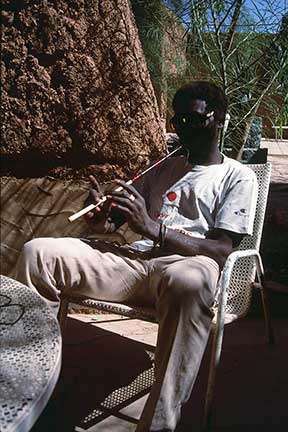South to Niger across the Sahara
From Tamanrasset, we headed south through the remote desert. Three days with no towns. There was a lot of sand and we traveled on more of a route than a road. We steered by the compass at times over the trackless waste.
When we got stuck, the driver would first engage four-wheel drive, then we'd all pile out and push. If that didn't work, we'd use sand mats, one for each tire. Somebody had to race from the back of the truck with the mat as soon as it was free and put it under the front tire. It worked.
One day we took time to play on a very steep-sided dune. It was a sandbox that exceeded imagination!
Crossing the border from Algeria to Niger took us all day—four hours to leave Algeria and about as long to enter Niger. Both countries conducted thorough searches. The officials were nice about it, just incredibly inefficient. At the Algerian border, we had to go into the office one by one in order of the passenger list. A man laboriously copied information into a book and checked our money declaration forms. After that, they searched everything (no one thought of searching while we were waiting in line). Then we had to drive 100 yards or so to immigration, where we again stood in line in the correct order while another man, wreathed in cigarette smoke, even more laboriously copied each bit of information from the passenger list into his register. Of course, all the information was on the passenger list, which they had been supplied. Bureaucracy at its finest.
There was another long wait while everything was typed, cross-checked and recorded. Then we waited in line one by one to be given back our passports. They wouldn't give them to the driver in a pile. At least Dennis and I were first in line. I pitied the folks behind us.
All this time it was about 95 degrees in the shade. This is the only time of year I'd want to be in the Sahara. It was quite nice most of the time. A couple of mornings on the Sahara we froze no thanks to a cold, biting pre-dawn wind that continued until about noon, when the heat settled.
We finally drove to the Niger border—closed from noon to 3:30. We waited in the heat, all dressed up in skirts and our best clothes.
At least we were first in line at 3:30. Several other parties didn't get through that day. They had to camp and finish up in the morning. We were required to empty the truck completely so inspectors could look through everything, piece by piece. The officials were quite pleasant. Unlike in Algeria, more than one person worked at one time. After the search, we had to go into the office one by one to present our passports and money.
No photos are allowed in Niger, anywhere, without a permit, which costs about $40 a day. It's a shame! It was incredible! We felt like we were really in Africa. Most people had very black skin. Instead of veils, the women wore beautiful colored wraps.
We arrived in Agadez and were immediately accosted by vendors of cigarettes and souvenirs. I was on guard duty, and got to practice my French for "Go away," and "I don't want anything!" They left me and swarmed around Dennis. He started practicing those phrases as well.
A couple of guys came up and just wanted to talk. I welcomed the opportunity to practice French, and felt pretty comfortable with one of them, who welcomed the opportunity to practice English. My French was probably a little better than his English. He showed us around Agadez. It's all adobe—a maze of passages, courtyards and streets. Very clean, I thought. At least there wasn't much western-style trash.
 His name was Ishmael, and he took us to the Tuareg market, which included a camel market. The shops or stalls were all of log frames covered with grass mats. The Tuaregs don't go to a pharmacy; they go to a sort of "medicine man" shop with dried plants and herbs, some kinds of rocks and minerals, lizard skins, fox head, and who knows what else? It was nice because Ishmael could answer many of our questions. He's part Tuareg, but considers himself Hausa. Away from the main market was the meat and animal market—meat on the hoof! Our driver bought a goat that we butchered ourselves and roasted over a spit. It was delicious!
His name was Ishmael, and he took us to the Tuareg market, which included a camel market. The shops or stalls were all of log frames covered with grass mats. The Tuaregs don't go to a pharmacy; they go to a sort of "medicine man" shop with dried plants and herbs, some kinds of rocks and minerals, lizard skins, fox head, and who knows what else? It was nice because Ishmael could answer many of our questions. He's part Tuareg, but considers himself Hausa. Away from the main market was the meat and animal market—meat on the hoof! Our driver bought a goat that we butchered ourselves and roasted over a spit. It was delicious!
When we returned to the truck, Ishmael saw my guitar. I played a couple of songs and then he started playing folk music of Niger. I tape recorded some of his songs. He took us to his house and allowed us to take a photo of him on his back patio (above).
Later, he played a Fulani instrument made out of a stalk of sorghum, and just before we left, I got a recording of a Tuareg friend of his playing a stringed instrument made of half a calabash (squash) with dried sheepskin stretched over it, a long hollowed-out piece of wood, and two strings. It's kind of like a guitar, and it's amazing the music he made with it. It felt like we were walking around in a National Geographic film, an African walking with us playing music while people in the street joined in and even started to dance around playfully.
We're in the Sahel region now. Today we stopped for lunch and three families showed up over the horizon from nowhere to watch. I guess watching us was like watching educational TV. Some in our group clowned around and the audience laughed. When we left, they begged for clothes.
The Sahel is drying up and turning into desert. There are lots of dead trees. Herds of goats and camels eat the little vegetation there is. People live in small round domed huts. Wish I could have taken pictures!
Go on to Photographs
Source: www.SusanCAnthony.com, ©Susan C. Anthony
